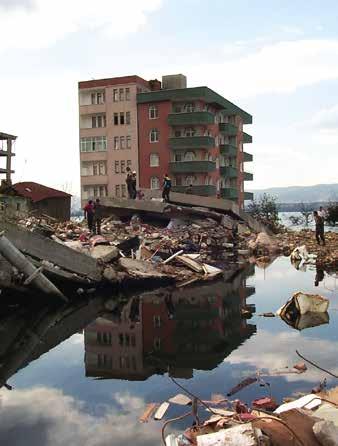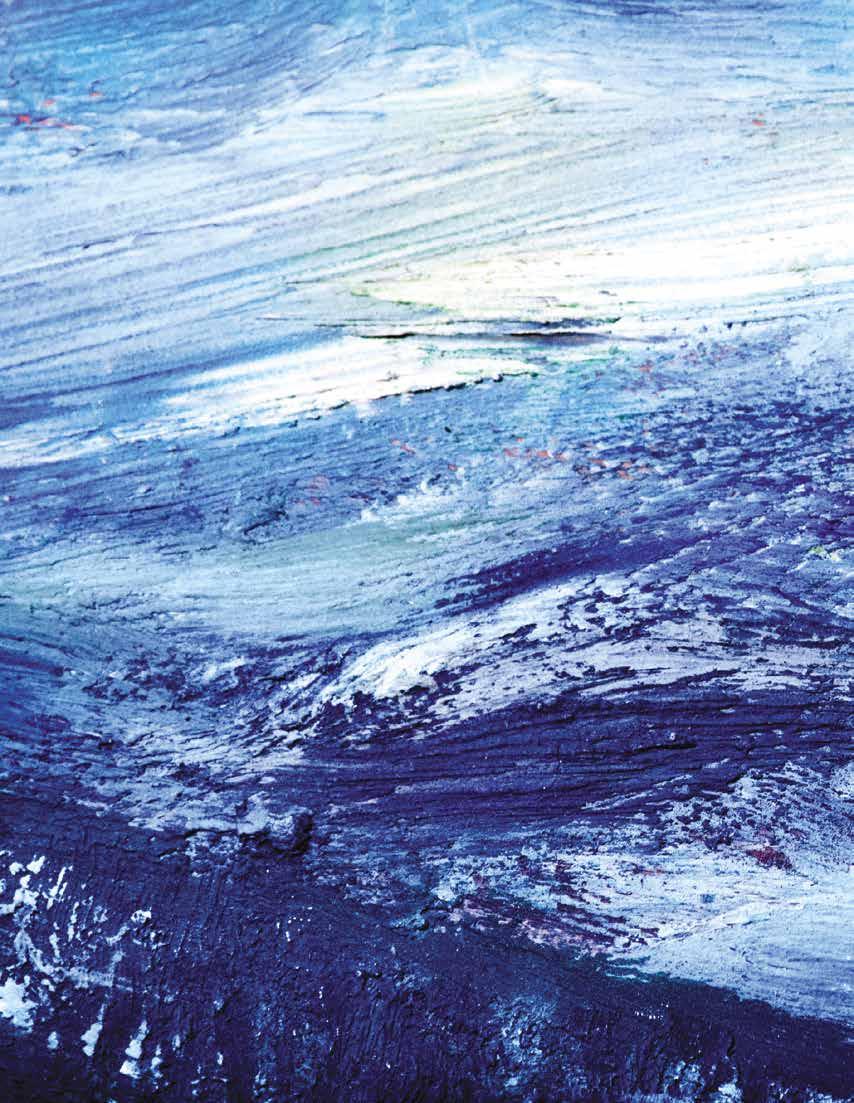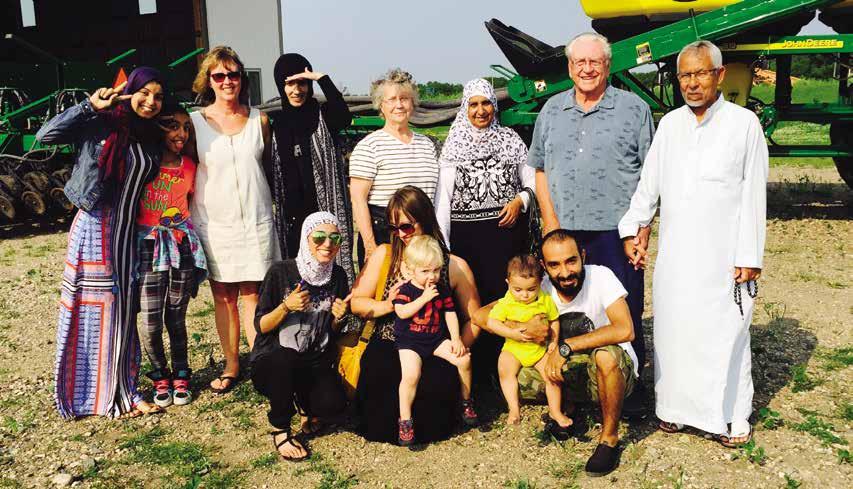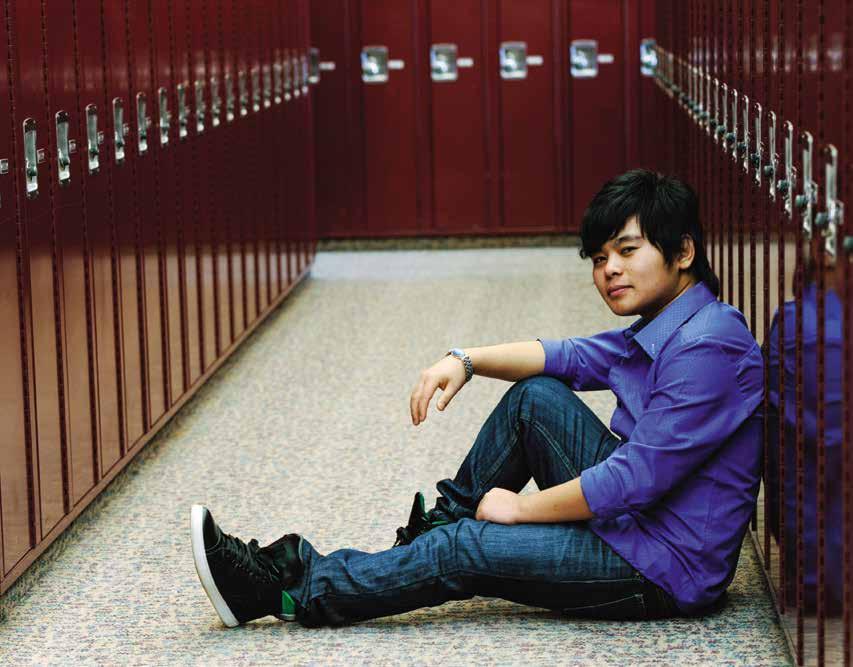
10 minute read
My Journey to America
Newzad Brifki holds a picture of his family in a refugee camp in Turkey.
By Newzad Brifki
Advertisement
My name is Newzad Brifki. I am from Kurdistan. Well, technically Kurdistan does not exist—it was split into four countries (northern Iraq, southern Turkey, eastern Syria, and western Iran) after the collapse of the Ottoman Empire during World War I. I am from the Kurdistan Region of Iraq. My life started in Duhok, Kurdistan, on October 12, 1984. I am the youngest of six siblings. Fighting between the Kurds and the Iraqi government turned into a genocide, in which Saddam Hussein used chemical gas on us and we had to flee our homes. More than two hundred thousand Kurds were brutally executed by firing squads, hangings, beatings, gas attacks, torture, being buried alive, and other things that are inhuman to describe. My father was one of the victims of Saddam’s campaigns; he was killed in 1985. On top of the hundreds of thousands of deaths, many were injured or paralyzed and have severe mental health issues today because of the war.
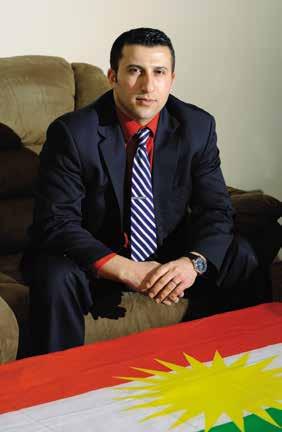
Newzad, founder and director of the Kurdish Community of America, in his office in Moorhead, Minnesota.
Photos by Andrew Cullen.
After our home was destroyed by Iraqi bombs, we had no choice but to leave. We tried to flee into Turkish Kurdistan, but the Turkish government refused to allow us in. After several days stranded with no food and water, during which time several children and elderly refugees died, the United States and the coalition forces saw what was happening. They dropped food and supplies for us by air, but the cold still killed many in the mountains. Finally, the western countries pressured Turkey into allowing us to enter as refugees. They let us in under one condition: for us to be placed in concentration camps surrounded by their soldiers. No one was allowed in or out without the Turkish soldiers’ permission.
LIFE IN THE REFUGEE CAMP
Life in the camp was very hard. We were given small rations of food, hygiene supplies were scarce, there was no clothing or running water, tents were in horrible condition, and we barely had anything to sleep on or to cover ourselves with at night. This was very difficult because many families had lots of children, and the limited supplies did not feed, warm, or cleanse everyone. Winter and rainy seasons were the worst in the refugee camp. We children had no toys; we used to roll up our socks—we had only one pair each—to play soccer with, and the mud was our playground. I remember many nights where we did not even have bread to eat and fell asleep hungry in the cold. Many of the other times when we were given bread, it was poisoned by the Turks to make us sick and kill us off.
Spending a whole four years in a camp was tough. I mean, even though camping may be fun for some people, that’s when it’s for a couple of days, not four years. During the last year of our stay at the refugee camp humanitarian organizations from the United States and other western countries came. A couple of Lutheran families from Fargo, North Dakota, sponsored my family to start a new life in America. We came to the United States on September 21, 1992, when I was seven years old, and that is how my life started in Fargo.
COMING TO AMERICA
When I arrived in the United States for the first time it was snowing big time. I had seen snow before and was used to it, but never had I seen so many cars before. It was really a cultural shock, because listening to English for the first time, it sounded like Chinese. I asked myself, “How do they talk like that?” My first neighborhood and school was Horace Mann in North Fargo. Life was good in the beginning, because I had never felt so good as a kid after four years of hell in the camps. The Horace Mann neighborhood kids were awesome. They brought me into their homes and we broke bread together. Their families were very nice and took care of me like I was their son. They paid for me to be in a soccer team with their kids for many years. They bought clothing for me, gave me money, took me fishing, took me to church, took me to the movies, and paid for other activities. My favorite was my first McDonald’s experience—I had never had a hamburger before, nor a Happy Meal, and it sure put a smile on my face. I still have many memories from that time that I will never forget.
There were many other Kurdish families who resided in Fargo, but not close to where we were living. My mom, a widow who had no skills to find a job and couldn’t drive, made us move closer to these families who could provide some assistance to us. I did not understand at that time and was very angry that we were moving, because everything was good for me. Overall this was beneficial for my family.
GROWING UP IN AMERICA
I am fortunate to have been raised here in America, even though life was hard in the beginning because of poverty. My mother never had the chance to get an education. Her life was more difficult, as she became an orphan when both of her parents were killed at an early age by the Iraqi regime. Being a single mother with no education or skills made it hard for her to find a job or even drive a vehicle, let alone raise a family in a completely new country. Our family faced extreme poverty and I used to hate going to school, because all the other kids had different sets of clothing on every day and I didn’t. On top of that, even though the school lunch food was free, it was not like the other kids’. They got to choose what they wanted, and I didn’t.
My family moved to Moorhead, Minnesota, in 1995 because of the lack of social services in North Dakota. We moved to a bad neighborhood called Romkey Park. At that time, gang activity was high in that area. I was exposed to so much bad stuff as a kid being around those people. Even though I tried to stay away, it was kind of hard, because I was surrounded by them. If I didn’t hang out with some of them, they would beat me up. So I used those few as a protection unit. They were constantly peer pressuring me to join their gang(s), and my answer was always no. Finally, they had enough of me, and one day I got jumped by over twenty people. Luckily I had a bigger brother and told him what had happened. He confronted them and told them to stay away from me. We finally moved to a nicer neighborhood after four years.
EDUCATION
Elementary school was my favorite. I did not know the English language but I really tried hard in learning. Also that time was more fun, with lots of activities, field trips, and recess time. When I got to middle school things were changing. My friends in elementary school started forming groups—popular, unpopular kind of thing. I had to really protect myself at this time as bullying was everywhere. My tactic was to be silly and be a goofball. I was disruptive to the teachers many times and to other students to get others’ attention. Even though I did not mean it, I had to do this for the other kids to look up to me in thinking I was funny and at times fear me rather than pick on me. I got into fights with older and bigger kids while protecting my friends, which got me suspended from school a couple of times. This helped with my reputation, and I was enlisted as one of the popular students.
Going through high school was a challenge for me as well. My freshman year, the family decided once again to move. More opportunities were supposedly in South Dakota, and we moved there for about three years. I didn’t really do my work and didn’t show up much for my classes. I really struggled with trying to fit in and making new friends. The friends I chose were not that smart or good decision-makers. I got into lots of trouble with them. Most of them were doing drugs, and that made me experiment with some as well. My senior year was coming and I decided my fate. Do I want to graduate with these guys who I just met for three years, or should I go back to Moorhead and graduate with my elementary friends? I finally decided to convince my family to move back. We did and this was the best thing that happened for me, even though I struggled during my senior year. I had to correct and make up for all the missed work from the previous years to be able to graduate. I was going to school from 7:30 a.m. to around 6:30 p.m. most of the week.

A photo of Newzad Brifki’s father, who died when Brifki was an infant, and a hat bearing the emblem of the Kurdish militia known as the Pesh Merga sit on a cabinet in his office.
Photo by Andrew Cullen.
There was a barrier coming back because of the September 11, 2001, terrorist attacks, which made my religion supposedly a threat. I was born a Muslim and did not understand what was happening at that time. A lot of old friends ignored me because of the political situation at that time and my religious background. A lot of them looked at me differently, and some stopped speaking to me. Despite it all, I didn’t give up, and I was happy because I still had a few great friends left. I graduated in 2003 with my head up high. My family was very excited for me, as was I. This was a good decision I had made.
After graduation my mother became very ill and this made me stick close by her side. I helped a lot around the house and in looking after her. It was great, because I started spending lots of time with my mother. She would tell me stories from the past and what she had gone through. Every day sitting with her I became wiser. She suggested I continue my education, and I did. I went to M State in Moorhead and got my associate’s degree in 2006. I would have finished faster, but I had a car accident and badly broke my left arm, requiring two surgeries, so I had to take a year off. I then went to Minnesota State University Moorhead and earned my bachelor’s degree in business administration in 2008. After completing my undergrad, I started a nonprofit organization called the Kurdish Community of America, promoting cultural education and acting as a resource center for the community members in need. I decided to continue my education, and in August 2014, I got my master’s degree from the University of Mary in business administration.
THE FUTURE
Looking back, I have been through a lot. Despite it all, I have learned from the past and learned from my mistakes in how to become a better person. I did a fundraiser in 2014 through the organization I run to help the refugees affected by ISIS (Daesh). The humanitarian aid was focused in the Kurdistan Region of Iraq with winter supplies to children, where there are over 1.5 million refugees displaced. This was great for me, because looking back, when I was a refugee, not much was done to help my family out. I had a calling and took action in helping these refugees. I was successful in raising around $20,000, which is more in the Iraqi dinar, and supplies are cheaper there as well. I, along with other volunteers in the Kurdistan Region, was able to help around 145 families, including 459 children.
On top of that, I am learning to be a good father for my children, which I never had. I want to be the change in the world. If I had the money and power, I would try to do more than what I can now to serve more people. My goals for the future are to be a successful entrepreneur and politician. I have been blessed to have been given the opportunity to be raised in this country. To be what I want to be without being from a specific religion, class, or ethnic group. At the end of the day, here we are all Americans. We have all come from somewhere else in the world, or at least our ancestors have, to make a new beginning in this country. A beginning under the Constitution, where all can have a chance for “life, liberty, and the pursuit of happiness.” God bless the United States of America.
NEWZAD BRIFKI is the founder and director of the Kurdish Community of America based in Moorhead, Minnesota.

